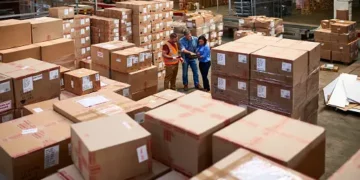The landscape of American manufacturing is undergoing a transformative shift, with increasing focus on alternatives to the long-established “Made in China” label. Geopolitical tensions and regional challenges, coupled with the disruptions caused by the Covid-19 pandemic, have prompted supply chain leaders to reevaluate the resiliency of existing supply chains and explore new models beyond the traditional Just-In-Time (JIT) approach.
Challenges of Rerouting Supply Chains:
The outsourcing of manufacturing and logistics processes has been a cornerstone of global enterprise strategies catering to the American market. However, the allure of fast, cheap, and easy solutions, which once drew companies to China, is fading amid mounting challenges. Despite China’s reputation for high-quality goods and efficient supply chain services, the extended wait times, shortages, and geopolitical uncertainties have supply chain leaders seeking alternatives.
Sean M. Francisco, Chief Operating Officer of Apex Logistics International, notes, “South Asian alternatives like Vietnam have emerged as competitive options, but businesses have hesitated due to concerns about cost, customs, and time constraints. Supply chain leaders are now seeking a pragmatic approach for long-term growth and planning.”
Data Points to an Exit Strategy:
Data from a recent Gartner survey reveals that 33% of supply chain leaders plan to shift part of their manufacturing to regional alternatives by 2023. Major tech giants, including Apple and Dell, are reconsidering subcontracting strategies due to years marked by delays and increased expenses. Rising wages, trade wars, and tariffs up to 25% have further complicated outsourcing decisions.
While obstacles like trade tensions and tariffs may persist, there is cautious optimism. Francisco suggests, “The pandemic has prompted supply chain leaders to vet outsourcing alternatives, realizing the need for diversification. South Asian countries such as Vietnam, Singapore, Malaysia, Indonesia, and the Philippines are becoming viable alternatives.”
Supply Chain Diversification with South Asia Connect:
Apex Logistics, a freight forwarding and logistics company, is actively addressing the need for diversification through its South Asia Connect program. The prepaid service program aims to provide a more predictable and timely supply chain journey, offering an air-capacity hedge to offset unforeseen circumstances. This initiative reduces costs and time of arrival through a Container Freight Station (CFS) bonded organization operating across Foreign Trade Zones (FTZ) and U.S. Customs Controlled Services.
Sean M. Francisco emphasizes the program’s benefits: “South Asia Connect saves time and energy by chartering carriers from South Asia through Hong Kong, compressing fuel and hours. With accessible gateway locations in Los Angeles, Chicago, Rickenbacker, and New York, businesses gain more control over their supply chain and logistics planning.”
As supply chain leaders navigate the complexities of a changing global landscape, the exploration of manufacturing alternatives in South-East Asia signifies a strategic shift. Diversifying supply chains through programs like South Asia Connect reflects a commitment to resilience, flexibility, and adaptability in the face of evolving challenges.
Explore top supply chain logistics news at The Supply Chain Report. Interested in international trade? Visit ADAMftd.com for free tools.
#AmericanManufacturing #SupplyChainDiversification #SouthAsiaConnect #MadeInVietnam #SupplyChainAlternatives #LogisticsInnovation #GeopoliticalShifts #PandemicResponse #ApexLogistics #TechSupplyChains #ManufacturingShift #SouthAsiaLogistics #RegionalManufacturing #SupplyChainResilience #FreightForwarding #ContainerFreightStation #JustInTimeAlternatives















